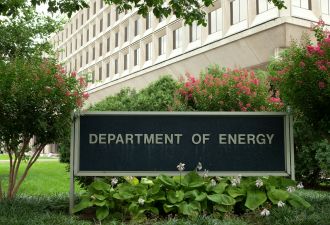In a victory for the energy storage industry, a federal appeals court has upheld the Federal Energy Regulatory Commission’s Order 841, clearing the way for transmission grid operators across the country to open their markets to energy storage, including aggregated batteries connected at the distribution grid or behind customers’ meters.
Friday’s court opinion (PDF) declared that FERC has jurisdiction over how energy storage interacts with the interstate transmission markets it regulates, even if those systems are interconnected to the grid under regulations set by the states.
The court also rejected arguments by utility groups and state utility regulators seeking to opt out of allowing energy storage resources (ESRs) to participate under Order 841, which allows for units as small as 100 kilowatts to access wholesale markets.
Instead, the three-judge panel of the U.S. Court of Appeals for the District of Columbia Circuit agreed with FERC’s contention that “[k]eeping the gates open to all types of ESRs — regardless of their interconnection points in the electric energy systems — ensures that technological advances in energy storage are fully realized in the marketplace, and efficient energy storage leads to greater competition, thereby reducing wholesale rates.”
Beyond helping to make wholesale markets more efficient, Order 841 has started to open new energy storage opportunities in grid markets in New England and New York. The rest of the country’s transmission grid operators, which manage wholesale markets serving roughly two-thirds of the country’s electricity customers, are creating their own Order 841 implementation plans.
Wood Mackenzie predicts that Order 841 will open up new opportunities for energy storage developers and aggregators that have primarily relied on state-by-state energy storage mandates and market opportunities to date. While energy storage industry groups have fought against some grid operators’ interpretation of Order 841, they’ve also hailed its broader potential benefits.
“This is an enormous step for energy storage, with the affirmation that energy storage connected at the distribution level must have the option to access wholesale markets, allowing homes and businesses to contribute to the resiliency, efficiency, sustainability, and affordability of the grid," Kelly Speakes-Backman, chief executive of the Energy Storage Association, said in an email.
"As our electric system becomes more modernized and distributed, we are seeing the regulatory frameworks at both the wholesale and retail levels adjust to that reality," Speakes-Backman said.
End of a long-running battle
The opinion marks what’s likely to be the final chapter in a long-running battle between FERC and energy storage and distributed energy advocates on one hand, and utilities and state regulators on the other, Jennifer Key, a partner of the Steptoe & Johnson law firm in Washington, D.C., said in a Friday interview.
“This ruling was a slam-dunk for FERC,” Key said. In fact, she said, it “went further than it probably even needed to to make it clear that FERC could preempt state interference in energy storage resources trying to reach the wholesale market.”
Groups including the American Public Power Association, the National Association of Regulatory Utility Commissions and the Edison Electric Institute had challenged Order 841 on the grounds that it could open state-regulated grids to being disrupted by batteries and other ESRs serving wholesale markets. But the court’s opinion noted that FERC is “not regulating matters of access” in Order 841 and that states retain authority over interconnection rules and processes as long as they don’t include a blanket prohibition against wholesale market participation.
Any appeal of Friday’s decision would likely face an uphill legal battle, Key said. In early 2016, the U.S. Supreme Court upheld FERC’s authority to regulate demand response in wholesale markets, a ruling that took FERC’s side in a far more complex federal-state jurisdictional battle than the one represented by states’ challenge to Order 841, she said.
Beyond clearing the way for grid operators to carry out their Order 841 implementation plans, the court’s decision “eliminates any of the jurisdictional barriers to rulemaking” on FERC’s long-delayed efforts to expand wholesale market access to a broader array of distributed energy resources, Key noted. FERC split that effort into a separate proceeding, RM18-9, while it works on the complexities of wholesale-retail market integration through the Order 841 process, as we note in this week’s GTM Squared.
“[Distributed energy resources] are uniquely valuable in that they can provide services across both retail and wholesale markets,” Jeff Dennis, managing director and general counsel of Advanced Energy Economy, a pro-renewables trade group, said in an interview this week. “Making sure they can provide both, and not be forced to pick one or the other, is an important issue.”




